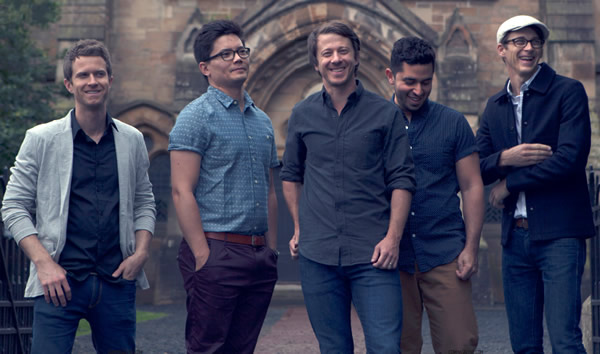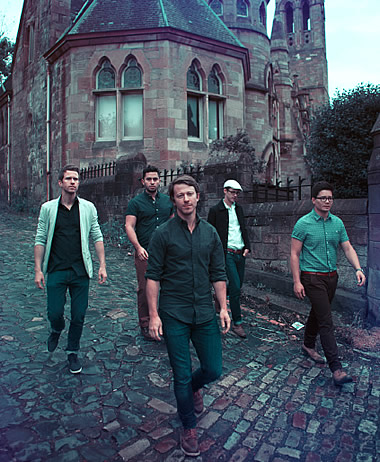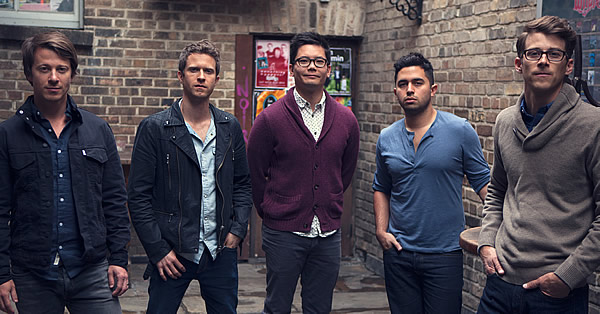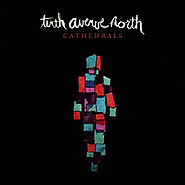
Throughout Church history, four walls and a steeple have housed the ideals of its membership’s convictions. While skyscraping spires focus believers’ faith on the hope of eternal life, at ground zero, day-to-day church life dirties the hands and feet of disciples committed to the paradigm-shattering plea of Jesus’ Matthew 6 prayer, “Thy will be done on earth as it is in heaven”.
Whether a home for orphans, meals for the hungry, a shoulder for the grieving widow or discourse with skeptics, for centuries the Christian church has provided literal sanctuary for the severest of broken hearts and fragmented lives.
But “sanctuary” has often been interpreted by the Western World’s modern church as a pulpit of politics rather than an asylum for the downtrodden. Defined by Webster’s as “a place of refuge and protection,” what was once an open invitation has evolved into closed communion.
Tenth Avenue North has made a name for itself by turning the surface dazzle of radio hooks into substantive spiritual convictions. A collective of musicians raised by the church as children and employed by it as adults, the celebrated band recognizes the modern-day disconnect between the life of Jesus and the life of the church and uses this keen awareness and music, the medium they know best and have exercised most, to motivate the messages on their fourth studio release, aptly titled Cathedrals.

“In days of old, a cathedral was a place where people could burst through the doors and cry, ‘Sanctuary!’” founding member and lead singer Mike Donehey explains with the fervor of a man on the brink of first-time discovery. “Can you imagine if we were so validated and filled by the Spirit of God that we could actually open our eyes and become a safe place for sinners?”
Or as he says, “If we were cathedrals.”
When Tenth Avenue North released their national debut over six years ago, little did the pop-rock quintet realize their discography would trace a musical Pilgrim’s Progress, journaling the members’ ongoing spiritual development and providing a substantive theological backbone to the band’s storybook commercial success.
 From the Gospel cry of the band’s smash debut, Over and Underneath, leading the listener to embrace God’s love through His promise to never leave our side, to the honesty-bearing transparency of their sophomore recording, 2010’s The Light Meets the Dark, Donehey says, “I don’t think the first step to believing the Gospel is being a good person. We become honest people, let the light in and then healing begins.”
From the Gospel cry of the band’s smash debut, Over and Underneath, leading the listener to embrace God’s love through His promise to never leave our side, to the honesty-bearing transparency of their sophomore recording, 2010’s The Light Meets the Dark, Donehey says, “I don’t think the first step to believing the Gospel is being a good person. We become honest people, let the light in and then healing begins.”
Moving the discography detail forward with the core message of their 2012 recording, The Struggle, he continues, “And when we’re honest, we can glory in Romans when Paul says we’re free to struggle.” But more than an isolated, internal spiritual experience, Cathedrals proposes that personal relationship with God is what motivates us into kingdom-building relationships with others.
“In Philippians (1:30), we read that we are in this struggle together,” the scriptureastute artist expresses. “As a band we are working on community, how to be for each other, to see each other, to be honest with one another. In Acts 17, in Colossians, in Corinthians, in Hebrews, Christ is the cornerstone and we are like spiritual stones being built together into the house of God’s Spirit. His Spirit no longer dwells in buildings, but in us.”
And through fellowship with each other, the Spirit is once again affirmed personally in our lives and through the lives of our neighbors—a loving full-circle experience that Mike says is hauntingly reflected in God’s own triune nature.
“[Belief in] the Trinity is of absolute importance because it deeply affirms that love is intrinsic to His nature,” Mike explains. “If He were just one, then love would be peripheral. If after God made someone then He could love him, love would be secondary. But because he has always existed as a relationship, then love must have always existed in Him.”
“So I don’t have to walk in this fear that He’s not going to love me. That’s who He is. God’s nature is love.”
We can all admit, it’s not easy to love others. Especially others we don’t understand. Differences in politics, race, economics and doctrine throw up immediate divides between pewmates. We barely understand God. So it makes sense that our neighbors, being created in His image, are equally inexplicable. We want to get along; we just can’t figure out how.
Donehey suggests one look at Jesus will help.
“Jesus was always available and always interruptible,” Mike relates, taking stock of the Messiah’s behaviors throughout the New Testament. “To be for other people means to let yourself be interrupted. People are more important than plans.” But in an age where rapid technological advancements have replaced sit-down conversations with on-the-go Facetime, creating space for others gets hairy.
“It’s painfully obvious that we are desperate for community. Retweet me! Like me! Follow me!” Mike exclaims, recognizing his millennial generation’s obsession with collecting friends online. “Yet social media can be confusing because it creates community on our terms. I follow who I want to follow, retweet who I want to retweet and block who I want to block. But we don’t really have a relationship with someone until they have the right to disagree with us.”
“If we haven’t received the validation of Christ, if we don’t realize that He is our Savior, then our job, what we can accomplish, are going to be the biggest priorities. But if we realize the most important part of our dreams is to be the hands and feet of Jesus, then it creates this space where our agendas can die and we can be available to offer life to other people.”

Using a modern hot button to example the function of this gracious space, Mike shares how a close bond with an openly homosexual member of his family has gifted him with a broader and more Biblical perspective of how to truly love one another.
“Homosexuality is a super sensitive topic because God created us male and female, meaning our sexuality is how we define ourselves,” he relates, as he considers his familial experience. “When there’s a question or confusion about sexuality, for the homosexual that’s who they [see themselves to be]. It’s their identifying mark. That’s deep. ‘Love the sinner, hate the sin’ [doesn’t work]. You can’t say, ‘God hates your homosexuality,’ without someone feeling like, You hate me.”
Donehey continues the challenging dialogue, saying Paul admonishes the church in 1 Corinthians 5 to keep each other accountable, but to withhold judgment from those outside of the body. “The modern American church is pointing the finger and calling out people who aren’t in the church and neglecting to remotely challenge each other in the church,” Mike says. “We need to create a space where people can hear the gospel. We need to listen more than we talk.”
So in all the modern-day puzzlement of how we as the church relate to God, ourselves and others, can Tenth Avenue North really inspire community with a four-minute pop song? Mike cites Psalm 49 as his reply. “‘I listen to wisdom, and with the music of the lyre I will solve my riddle.’ I write songs,” he says, “to unriddle what is going on in my heart.”
Expounding on Bono’s infamous quote, “Gospel music is the stuff of faith. But the blues tell us where we are,” Mike unpacks the U2 lead singer’s thought process further, sharing, “Truth without emotion and the struggle to believe can be harsh. Yet feelings without truth or any idea of where you are going can just be sentimentality. With these songs I want to acknowledge where I am and what I feel, but I also want to call myself out and say, This is where I’m going.”
“We don’t have to be afraid of a secular world,” he concludes. “If we bring the Holy Spirit with us, then everywhere we go becomes sacred.”
 With over one million units sold, Tenth Avenue North is considered one of Christian music’s top creative and commercial forces. The bestselling discography has spawned a handful of Dove Award wins and chart-topping radio hits, and the band’s core message of hope through redemption has endeared them to thousands of fans. With over one million units sold, Tenth Avenue North is considered one of Christian music’s top creative and commercial forces. The bestselling discography has spawned a handful of Dove Award wins and chart-topping radio hits, and the band’s core message of hope through redemption has endeared them to thousands of fans.
And until now, the bulk of their impactful song catalog developed with the influence of songwriters outside of the band. But on the popular quintet’s fourth studio recording, Cathedrals (Reunion Records), band members penned each track together while rollicking on the road as a part of Winter Jam’s cross-country lollapalooza earlier this year — appropriate considering the album’s focus on the importance of community. “This record was the first record we wrote with no outside co-writes. [The process] was very communal,” Donehey explains. “You constantly let your ideas die when bringing them into community. It’s painful. But now, when we play these songs, it’s like there is a train behind us. It’s really cool that the theme of the record played into how we made it.” Produced by John Fields, famous for helming records by perennial acts like Switchfoot and Pink, Cathedrals unashamedly imbues the pop-rock hooks radio fans crave with band members’ personal musical preferences, granting listeners a more intimate and mature look into the ongoing creative evolution of Tenth Avenue North. |
FOR MORE INFORMATION, VISIT TENTHAVENUENORTH.COM

 Listen Live
Listen Live
Leave a Reply
You must be logged in to post a comment.